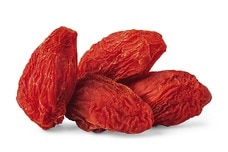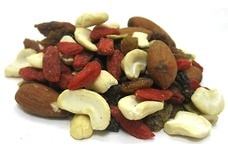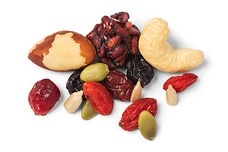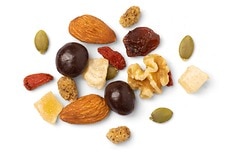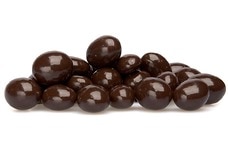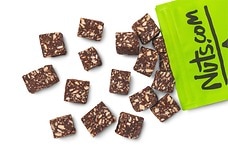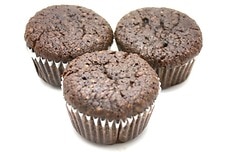Benefits of Goji Berries
Goji berries are one of the hottest superfoods on the market. Native to Tibet and the Himalayas, goji berries (also called “wolfberries”) are brightly colored and sweet in taste. These berries have been used in traditional Chinese medicine for centuries, where they are thought to help with liver, kidney, and eye problems (Carey, 2014). Now, goji berries are being extolled for their amazing nutritional properties and beneficial phytonutrients.
Fortunately, there are many easy ways to get more goji berries into your diet. Finding fresh goji berries in the United States is tough, but dried or powdered goji berries are easier to find. To incorporate goji berries into your diet, add a spoonful of goji berry powder to a glass of lemonade or stir a heaping tablespoonful into a fruit pie. When working with dried goji berries, you can rehydrate them in warm water before blending them into a smoothie. Or, simply eat the goji berries by the handful. They also make a welcome addition to trail mix with almonds, dark chocolate, and sesame seeds.
Goji Berries are Chock Full of Beneficial Phytonutrients
The word “phytonutrients” simply means beneficial nutrients that come from plants. This encompasses a range of beneficial compounds that seem to have a positive impact on human health. One of the reasons goji berries have been labeled a superfood is that they are full of phytonutrients.
Goji berries are an excellent source of the phytonutrient antioxidants zeaxanthin and lutein. These compounds are both carotenoids, a type of molecule that may reduce oxidative damage within your cells. Lutein and zeaxanthin are important for eye health. Within the eyes, these molecules filter out the high-energy blue wavelengths of light that can harm the healthy cells in your eyes (American Optometric Association, 2014). In fact, measuring the amount of lutein and zeaxanthin in the retina can be used to predict visual functioning and risk of eye disease. Unfortunately, your eyes cannot create their own lutein or zeaxanthin, meaning that you must get these antioxidants from foods such as goji berries.
Goji Berries Are an Amazing Vegetarian Source of Iron
Spinach is often lauded for being a great vegetarian source of iron, but goji berries have even more iron than spinach. One ounce of goji berries contains 14% of your recommended daily intake of iron (Self Nutrition Data, 2015). Getting enough iron is associated with better cardiovascular functioning, as iron is needed for hemoglobin to carry oxygen to your cells.
As with all vegetarian sources of iron, the iron available in goji berries is known as non-heme iron. Non-heme iron is not absorbed as efficiently as heme iron (available only through animal products), meaning that it is important to eat plenty of goji berries and other iron-rich foods to ensure you get enough. Fortunately, goji berries also contain vitamin C, which increases the bioavailability of non-heme iron (Mengels, 2013).
Eating Goji Berries Boost Your Riboflavin Intake, Promoting Efficient Metabolism
Riboflavin, also known as vitamin B2, is one of eight vitamins that make up B vitamin complex. All of the B vitamins help your body turn carbohydrates from food into useable energy (glucose). B vitamins also assist your body in metabolism of protein and fats (Erlich, 2015). Because riboflavin is water soluble, your body does not store excess riboflavin to use in later times of need. Thus, you must continue to consume sources of the vitamin to ensure you get enough.
Failure to get enough riboflavin in your diet is associated with digestive problems, eye fatigue, sensitivity to light, slowed growth, and chronic fatigue (Erlich, 2015). Women should aim to get 1.1 mg of riboflavin every day, while men need 1.3 mg daily. A one-ounce serving of goji berries contains 0.4 mg of riboflavin, nearly half your recommended daily intake.
Goji Berries Contain the Trace Mineral Copper, Which Supports Cardiovascular and Neural Health
Copper is a chemical element that is needed by the body in trace amounts. Most foods that contain copper are animal products such as liver, mollusks, crab meat, or oysters. Thus, for vegetarians and vegans, goji berries can provide a robust source of this trace mineral.
Copper plays a variety of roles in the human body, including acting as a cofactor for certain reactions or making up enzymes involved in iron metabolism and energy production. In large-scale scientific studies, increasing copper intake has been associated with better cardiovascular health, effective immune system functioning, and lower risk of osteoporosis (Prohaska, 2014). In fact, getting plenty of copper in your diet may decrease risk of neurodegenerative conditions such as Alzheimer’s disease or Parkinson’s disease, although more research is needed to confirm these findings (Prohaska, 2014). Regardless, goji berries are a potent source of this valuable mineral. A one-ounce serving of goji berries contains 0.6 mg, or 28% of your recommended daily intake of copper.
Recipes Containing Goji Berries
The following recipes offer delicious dishes that each offer a means of adding these sweet superfoods to your diet. Discover the benefits of goji berries by trying one of these recipes today!
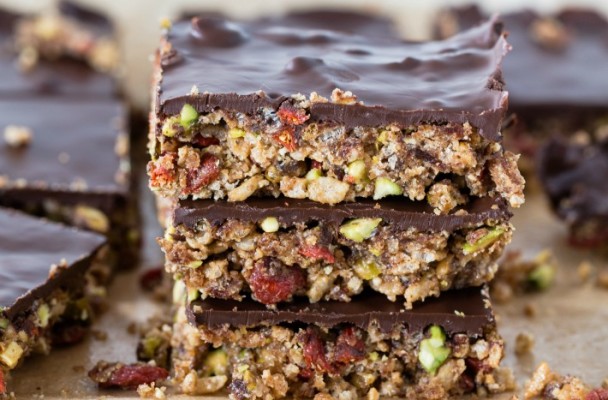
Chocolate Goji Berry Bars Recipe {gluten-free}
These invigorating energy bars contain the fruit as a means of providing a source of antioxidants and natural sugars to help meet your nutritional needs in that midday slump.
Ingredients: Pitted dates, almond butter, quinoa puffs, goji berries, raw pistachios, coconut oil, dark chocolate chips.
Total Time: 20 minutes
| Yield: 8 bars
Goji Berry Products
While you can find a stellar assortment of goji berry products on our goji berry page, there are even more mixes that contain the dried fruit as part of a delectable assortment of wholesome foods. Browse the options below or make your own trail mix featuring the beloved berries!
Healthy Eating
- Healthy Snacks
- Healthy Meals
- Healthy Recipes
- Sports Nutrition
- Nutrition and Special Diets
- 21 Day Fix
- 5 Popular Diet Similarities
- Alkaline Diet
- Anti-Inflammatory Diet
- Calorie Counting
- Carb Cycling Diet
- Celiac Disease
- Cholesterol
- Clean Eating
- Crohn's Disease
- DASH Diet
- Detox Diet
- Diabetes
- Diabetes Diet
- Diet Pill Dangers
- Fat Burning Foods
- Gluten-free Diet
- Glycemic Index
- Heart Health
- High Blood Pressure Diet
- High Fiber Foods
- How to Eat Healthy
- How to Lower Blood Pressure
- Hypertension
- IBS Diet
- Ketogenic Diet
- Liquid Diet
- Low GI Foods
- Low-Carb Diet and Foods
- Low-Fat High-Carb Diet
- Mediterranean Diet
- Mediterranean Diet Foods
- Military Diet
- Nutrition Labels Explained
- Paleo Diet
- Raw Food Diet
- Superfoods
- Sustainable Weight Loss
- Thrive Diet
- Vegan Diet
- Vegetarian Diet
- Weight Loss Shakes
- Whole30
- Vitamins, Minerals & Nutrients

